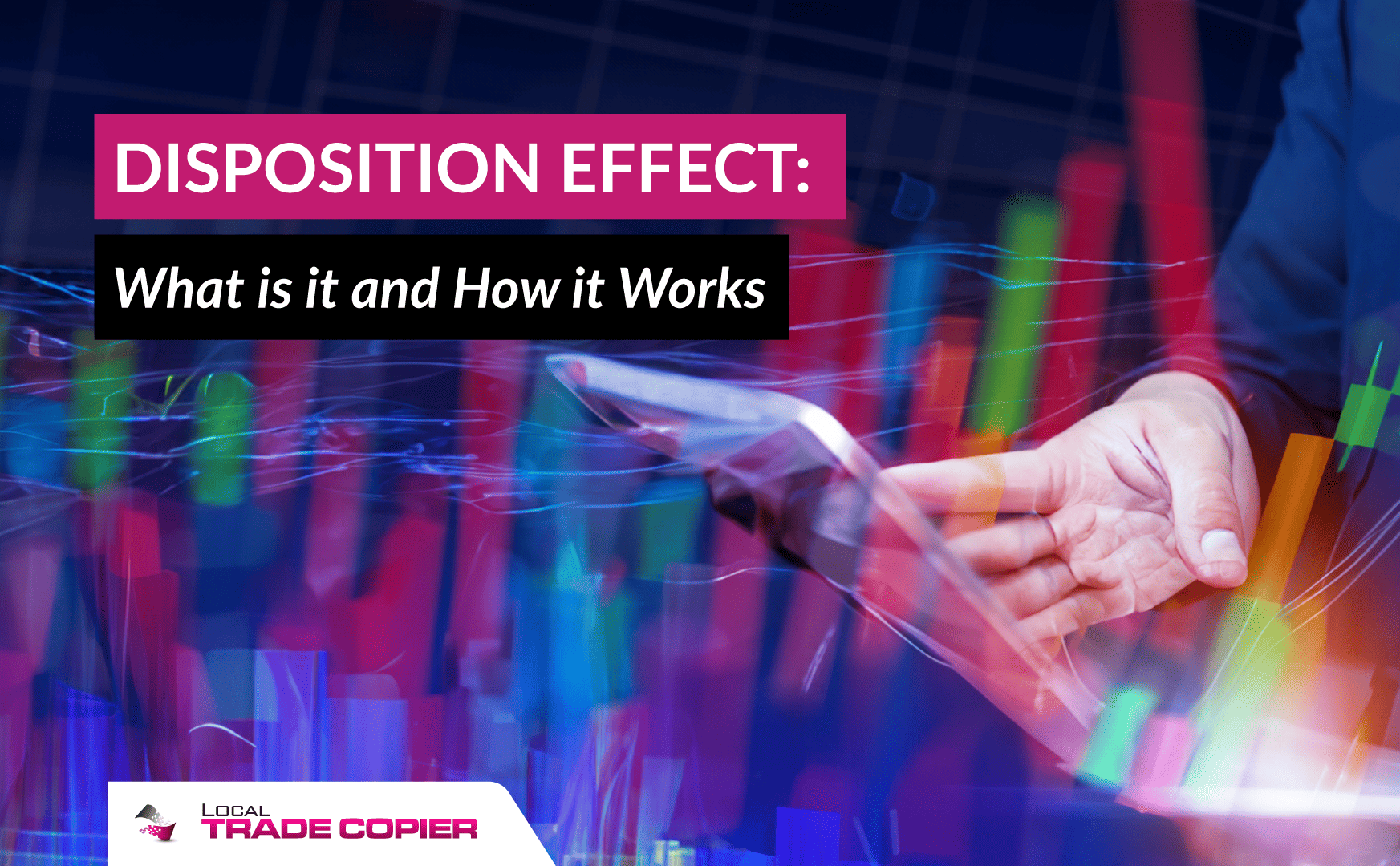
Exploring the Impact of the Disposition Effect on Forex Market Decisions | Traders' Guide

Exploring the Impact of the Disposition Effect on Forex Market Decisions | Traders’ Guide

Investing in the financial markets is not just about crunching numbers and following trends; it’s a complex interplay of financial analysis and human psychology. One intriguing psychological phenomenon that greatly influences investment decisions is the Disposition Effect. In this article, we’ll explore the intricacies of the Disposition Effect, what it is, and how it works, giving you a deeper understanding of this fascinating aspect of behavioral economics.
Table of Contents
- Understanding Disposition Effect
- Factors Contributing to Disposition Effect
- Behavioral Economics and the Disposition Effect
- Psychological Explanation
- Real-Life Examples
- The Impact of Disposition Effect on Investment Decisions
- Strategies to Overcome the Disposition Effect
- Behavioral Biases in Investment
- Common Misconceptions
- How to Identify Disposition Effect on Your Investment
- Overcoming Disposition Effect
- Avoiding Emotional Decision-Making
- Practical Tips for Investors
- Conclusion
- FAQs
Disclaimer: This post includes affiliate links
If you click on a link and make a purchase, I may receive a commission at no extra cost to you.
Understanding Disposition Effect
The Disposition Effect , in essence, is a peculiar bias that influences how people make investment decisions. It refers to the tendency of investors to hold on to losing investments longer than they should while quickly selling profitable ones. Essentially, it’s the opposite of what traditional investment wisdom suggests, which is to cut your losses and let your profits run.
Factors Contributing to Disposition Effect
Several psychological factors contribute to the Disposition Effect. One of the key factors is “loss aversion “. This concept describes the discomfort and unease investors feel when realizing losses. In simple terms, people hate losing money, so they avoid selling a losing investment to escape the emotional pain associated with it.
Another significant factor is “cognitive dissonance “. This term represents the mental discomfort one experiences when holding conflicting beliefs. For example, an investor may believe they are skilled at investing while also possessing a portfolio filled with losing stocks. This dissonance pushes them to keep their losing investments, reinforcing the Disposition Effect.
And then, there’s “regret aversion “. People fear making decisions that may lead to regret, so they often choose to do nothing instead of making a decision. This regret aversion can significantly impact their investment choices.
Behavioral Economics and the Disposition Effect
The Disposition Effect is a prominent subject in the realm of behavioral economics. This field combines the principles of psychology and economics to understand why people make irrational decisions. The Disposition Effect is a perfect example of how human emotions and cognitive biases can sway rational decision-making, especially in the realm of investments.
Psychological Explanation
The Disposition Effect can be explained through the Prospect Theory, developed by renowned psychologists Daniel Kahneman and Amos Tversky. This theory suggests that individuals make decisions based on perceived gains and losses rather than final outcomes. When faced with a profit, people tend to become risk-averse, opting to lock in their gain. Conversely, when they encounter a loss, they become risk-seeking, holding onto the losing investment in the hope that it will turn around.
Real-Life Examples
Real-life examples of the Disposition Effect are abundant. One of the most famous cases was during the late 1990s, with the infamous “dot-com bubble “. Many investors refused to part ways with their overvalued tech stocks, even when it was clear the bubble was about to burst. They clung to their losing investments, hoping for a miracle that never came.
The Impact of Disposition Effect on Investment Decisions
The Disposition Effect can have a profound impact on investment decisions. It can lead to significant portfolio losses, missed opportunities, and emotional stress. Understanding and addressing this bias is crucial for long-term success in the financial markets.
Strategies to Overcome the Disposition Effect
Overcoming the Disposition Effect requires a disciplined and rational approach to managing your investments. This includes setting clear investment goals, diversifying your holdings, and adhering to a well-defined trading plan. Here are some effective strategies:
1. Set Clear Investment Goals
Before you make any investment, establish clear and achievable goals. This will help you make decisions that align with your financial objectives.
2. Diversify Your Portfolio
A diversified portfolio can help spread risk and reduce the impact of individual losing investments. Don’t put all your eggs in one basket.
3. Stick to a Trading Plan
Having a trading plan in place will keep you on track, preventing impulsive decisions based on emotions.
4. Regularly Review and Rebalance Your Portfolio
Periodically evaluate your portfolio to ensure it aligns with your investment goals. Make adjustments as necessary to keep your investments on track.
5. Seek Professional Advice When Needed
Financial professionals can offer valuable insights and guidance. Don’t hesitate to consult with experts when making important investment decisions.
Behavioral Biases in Investment
Understanding the Disposition Effect is just one piece of the puzzle when it comes to recognizing behavioral biases in investment. Other common biases include confirmation bias, anchoring, and herd mentality, all of which can significantly impact investment decisions.
Common Misconceptions
A common misconception is that the Disposition Effect only affects novice investors. In reality, even seasoned professionals can fall victim to this cognitive bias. Being aware of it is the first step towards avoiding its negative consequences.
How to Identify Disposition Effect on Your Investment
Identifying the Disposition Effect in your investment decisions involves introspection and self-awareness. Ask yourself whether you are holding onto losing investments out of fear or hope, and if you are too quick to sell winning positions.
Overcoming Disposition Effect
To overcome the Disposition Effect, one must be disciplined and systematic in their approach to investing. By setting clear rules for when to buy and sell, investors can minimize the impact of this bias on their portfolio.
Avoiding Emotional Decision-Making
One way to avoid falling prey to the Disposition Effect is to take emotions out of your investment decisions. Stick to a well-thought-out strategy and avoid making impulsive choices based on fear or greed.
Practical Tips for Investors
- Maintain a diversified portfolio.
- Set clear investment goals.
- Follow a disciplined trading plan.
- Regularly review and rebalance your portfolio.
- Seek advice from financial professionals when needed.
Conclusion
The Disposition Effect is a captivating psychological bias that can significantly impact investment decisions. By understanding its underlying causes and implementing strategies to counteract it, investors can make more rational and profitable choices in the financial markets.
So, the next time you find yourself clinging to a losing investment while wondering why, remember that the Disposition Effect might be at play. It’s a human tendency that all investors should be aware of, regardless of their level of experience.
FAQs
1. What is the Disposition Effect?
Ans. The Disposition Effect is a psychological bias that leads investors to hold onto losing investments while quickly selling winning ones.
2. Why do investors exhibit the Disposition Effect?
Ans. Investors exhibit the Disposition Effect due to factors like loss aversion, cognitive dissonance, and regret aversion, which make them reluctant to realize losses.
3. Can experienced investors also fall victim to the Disposition Effect?
Ans. Yes, even experienced investors can fall victim to the Disposition Effect. It is not limited to novice investors.
4. How can investors overcome the Disposition Effect?
Ans. Investors can overcome the Disposition Effect by maintaining a disciplined and rational approach to investing, setting clear goals, and sticking to a well-defined trading plan.
5. What are some common behavioral biases in investment?
Ans. Common behavioral biases in investment include confirmation bias, anchoring, herd mentality, and the Disposition Effect. Recognizing and addressing these biases is crucial for making sound investment decisions.
Related posts:
- Forex vs. Stocks: Which is Better?
- How to Manage Risks with the Consumer Price Index (CPI) in Forex Trading
- Top 13 Mistakes That Forex Traders Should Avoid
- Tips to avoid a forex scam or pyramid scheme
Also read:
- [Updated] Pinnacle VR Devices The Essential List
- 「YouTube字幕抹消の究極ガイド: 3つのシンプルな手順」
- 2024 Approved The Pros & Cons of Using Vidma as a Screen Grabber
- 2024 Approved Zoom's Secrets to Flawless Live Video Streaming on YouTube
- Cleared Up: Why My NVIDIA GPU Isn't Showing
- Download & Update GTX 1650 SUPER Drivers - Windows 11/11
- DVD動画文字起こしテクニックのガイド
- From Spoken Voice to Textual Output in Seconds - Whisper's Guide
- Media Exposure
- MP3形式にしたいWMA音楽: 信頼できるオンラインコンバーターをご紹介
- Rotating Your Videos with Ease: A Step-by-Step Guide Using Media Player Classic
- Seamlessly Transfer Your Memories - Mastering Google Photos Video Uploads for Beginners and Pros!
- Step-by-Step Guide: Crafting the Perfectly Uncomfortable Potion in Minecraft
- The Twitch Loophole Reviving Forgotten Chats for 2024
- Troubleshooting Tips: Clearing Up 504 Gateway Timeout Errors Quickly
- スピーディな動画マージのコツ:AviUtlで挑戦しよう
- Title: Exploring the Impact of the Disposition Effect on Forex Market Decisions | Traders' Guide
- Author: Scott
- Created at : 2025-02-28 20:07:04
- Updated at : 2025-03-07 16:37:30
- Link: https://win-top.techidaily.com/exploring-the-impact-of-the-disposition-effect-on-forex-market-decisions-traders-guide/
- License: This work is licensed under CC BY-NC-SA 4.0.